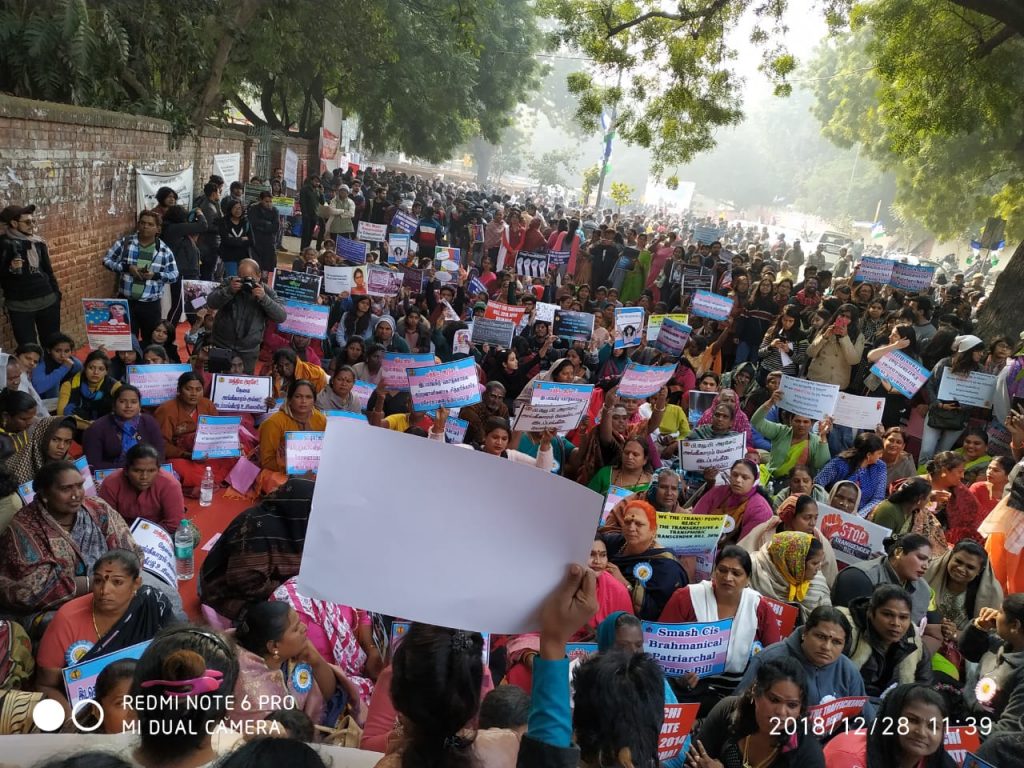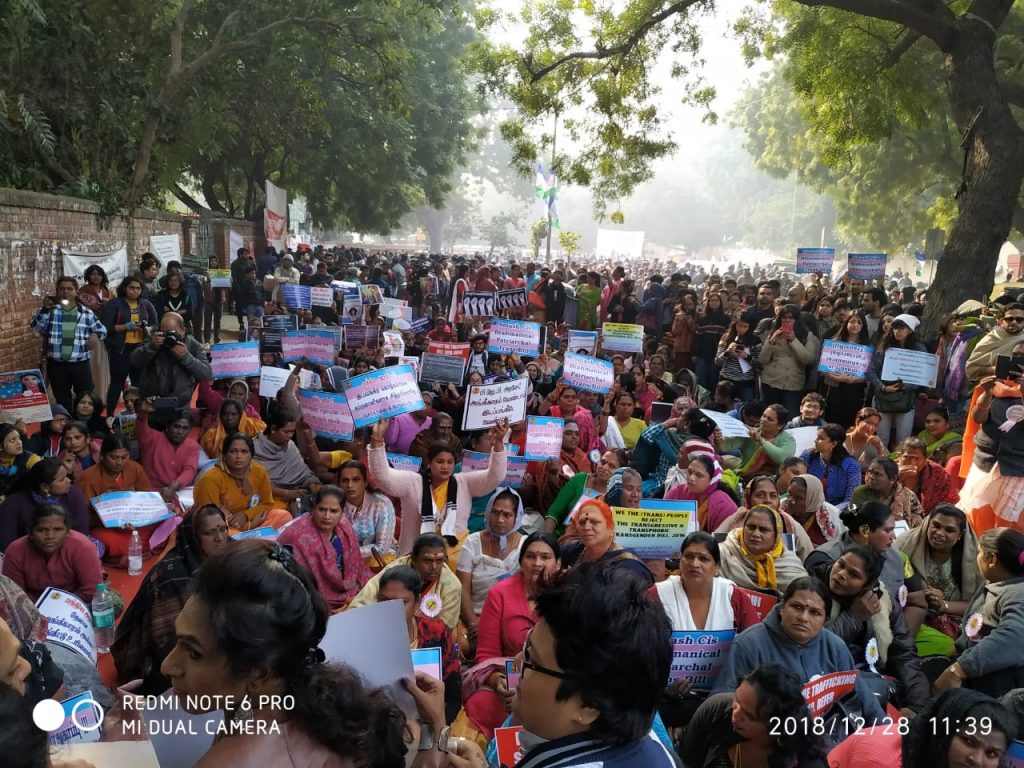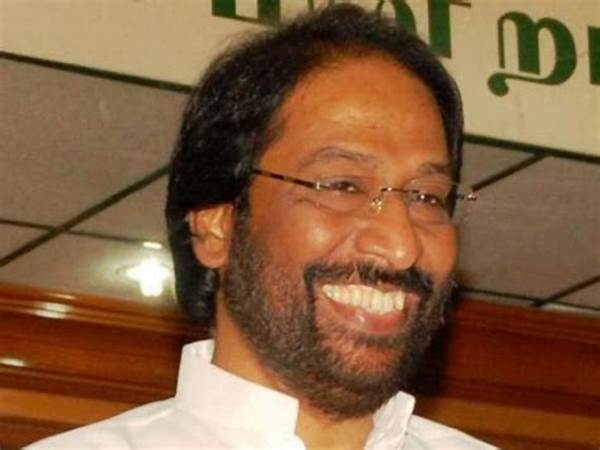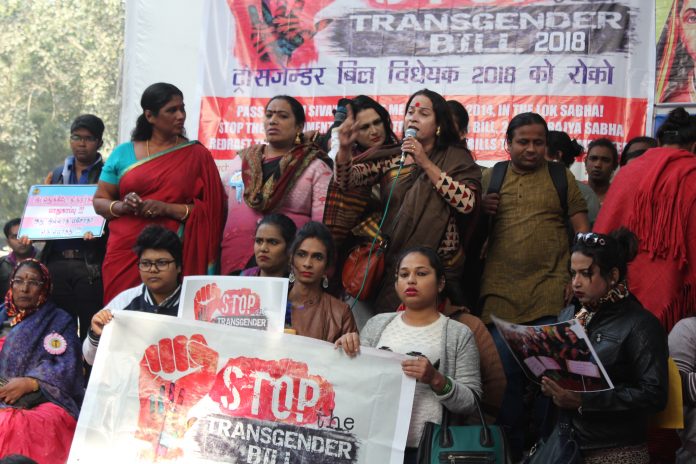Members of communities all across the country came to Delhi from Tamil Nadu, Karnataka, W. Bengal, Telangana, Andhra Pradesh, Kerala, Manipur, Haryana, Gujarat, Maharashtra, and Uttar Pradesh.
The protest at parliament street took place in response to the Lok Sabha passing the Transgender Persons (Protection of Rights) Bill, 2018. This Bill contradicts, rather than protects, many of the rights and protections laid out in the country’s Supreme Court’s NALSA verdict of 2014. Along with the Trafficking of Persons (Prevention, Protection and Rehabilitation) Bill, 2018, this regressive and dangerous legislation will subject the thirunambi, thirunangai, transgender, hijra, kinner, intersex and gender non-conforming communities in India to increased discrimination, harassment, and institutional violence.
How the Bill is harmful and not helpful?
- This Bill upholds the establishment of screening committees, comprised of District Magistrate, Psychiatrists, Medical Officers, and one Trans person, which will have the power to determine whether or not an applicant qualifies as transgender. The process of “proving” one’s gender in front of a committee violates multiple fundamental rights, and is utterly humiliating. The Bill also mandates “surgery” as the basis for applicants to qualify as transgender and avail of protections. This requirement violates the principle of self-determination of identity for Trans, Intersex, and GNC people, and disenfranchises many who cannot afford surgeries as well as those who do not desire any surgeries.
- The Bill criminalizes begging, sex work, and other forms of livelihood that many in the trans communities depend on to survive. Contrary to the stated purpose of the Bill – Protection of Trans persons’ Rights – it criminalizes and discriminates against us, specifically targeting entire communities of Transwomen, Hijras, and Transfeminine people who have historically practiced begging and sex work as the primary source of income. The Trans, Intersex and GNC communities thus firmly oppose this Bill along with similarly criminalizing and discriminatory provisions of the Trafficking of Persons (Prevention, Protection, and Rehabilitation) Bill 2018. Both Bills are currently pending before the Rajya Sabha and must be withdrawn in their current form.
- The Trans Bill 2018 also denies reservations and affirmative action for trans, intersex and gender nonconforming people in employment, education, and healthcare. Thus between criminalizing begging and sex work, and denying reservations, it puts our very lives at stake.
- The Bill requires Transgender people, to reside with their birth family – even though birth families are often the first site of violence against these individuals. If trans people are aided by other Trans community members in escaping such conditions at home, the community members can be imprisoned for up to 4 years
- The Bill postulates that sexual violence against trans people will face punishment up to 2 years, in comparison with the 7yrs of imprisonment for sexual violence against non-trans women. In this way, the Bill directly discriminates against the Trans, Intersex and GNC communities and strips us of dignity and equality
- The Bill has labelled all intersex people as transgender. This is a gross violation of the right of self-determination of intersex people, many of whom do not identify as transgender.

Journey of the Transgender persons ( Protection of rights) Bill :
The landmark decision of the Supreme Court in National Legal Services Authority v. Union of India also in 2014, known as NALSA verdict accorded transgender individuals the right to self-identify as third gender or within the binary, as male or female; and ruled that insistence on sex reassignment surgery, hormone therapy, or other procedures to legally declare gender was illegal and immoral. The verdict also directed the Centre and State Governments to provide the community various social welfare schemes and to treat the community as socially and economically backward classes. It asked for the transgender community to be extended reservation in educational institutions and for public appointments, proper medical care and separate public toilets. It also asked for the recommendations of the Expert Committee Report on Transgender persons (released February 2014) to be reviewed in light of the verdict and be implemented within six months, i.e. by October 2014.
After this positive verdict, “Rights of Transgender Persons Bill 2014” was passed in 2015 in Rajya Sabha, then a private member’s bill by a MP from Tamil Nadu, Tiruchi Siva, was introduced. Tiruchi Siva’s bill had all the recommendations of the NALSA judgment including the reservations and employment opportunities. But sadly it was not passed and kept pending in the Lok Sabha.
Later in 2015, the Ministry of Social Justice and Empowerment drafted a Rights of Transgender Persons Bill (2015), and sought public input, with comments to be submitted by 14th January, 2016. . The draft bill received substantial input from transgender and intersex led groups, as well as from LGBTIQ and ally groups.
The Transgender Persons (Protection of Rights) Bill 2016 was then introduced in the Lok Sabha on August 2, 2016. However it did not incorporate any of the community feedback given to previous versions of the Bill. It sought feedback from the community which were given but all of the feedback was ignored except for the revised definition of ‘ transgender’. And on 17th December 2018 the Transgender persons ( Protection of rights) Bill was passed in the lower house of the Indian parliament.
Reaction of the trans community:
Members of the community also burnt copies of the bill and sloganeered against the BJP government. Representatives from workers and students organizations also attended and gave their support to the mobilization.
Grace Banu, Dalit and transgender activist and the first transgender person to be admitted to an engineering college in the state of Tamil Nadu said “Without reservation, we have no opportunities. No one is ready to offer us the chance to work. If we aren’t given the chance to live, why doesn’t the government just euthanize us or declare us refugees in our own country?”.

Meera Sanghamitra, National Alliance of People’s Movements (NAPM) and Telangana Hijra Intersex Transgender Samiti (THITS) gave her statement to TwoCircles.net :
While on the one hand, as feminists, trans and human rights activists and collectives, we are constantly struggling to expand the protective and affirmative legal discourse to de-legitimize patriarchy, especially in domestic, socio-economic spheres; the three legislations in question pushed by a right-wing government reinforce stereotypes, legislate second-class citizenship, perpetuate historical injustice against trans persons, intersex, gender non-conforming persons, sex workers, surrogate women and raise rudimentary concerns of ‘protective laws’ becoming tools for further marginalization and oppression of already violated populations and denial of constitutional safeguards.
It took countless struggles by the transgender community and 70 years for the Supreme Court of this country to recognise the historical injustice and uphold our rights as equal citizens and now this Bill seeks to take away these limited rights as well by making a law with unconstitutional provisions, legislating second class citizenship and further marginalizing us. We seek immediate withdrawal of this Bill and an overhaul based on community consultations, during which period NALSA must be strictly implemented.
Subikshamma, another activist said that the community will oppose this government to the very end on this bill.
Several transmen activists spoke up about their struggles and unique needs as a largely overlooked group within the trans community. Satya Rai Nagpaul, Kiran Raj from Telangana, Kiran from Karnataka, Saransh from Delhi and Selvam from Tamil Nadu were some of the transmen who voiced their protests strongly and demanded for the Bill to be stopped.
“If you, a cisgender person, are not asked to strip before anyone to prove your gender, why should I? I am a man, and have identified that way since childhood, and I should not have to prove this to anyone”. Asked Saransh “How much longer must we struggle to just be seen as human like everyone else?”.
Gee Imaan Semmalar from Karnataka told TwoCircles.net “The Bill is passed in the Lok Sabha. It is yet to be approved by the Rajya Sabha so we are lobbying with opposition MPs of Rajya Sabha to oppose or amend the bill. yesterday, an Indian express report said that the govt has agreed to send it to a select committee but our understanding is that this has to be placed on the floor of the house and passed by the chairman. So we are hoping that it happens soon or that this bill lapses. If the bill is passed then we have to fight it legally .”
Rani, a transwoman leader from Karnataka said “Many of us come from poor backgrounds and our only acceptance is from the transgender community, our only livelihood is from traditional begging. If even that is criminalized, we will starve”.
Chandramukhi Muvvala, the transwoman who had contested for MLA from Hyderabad said “Implement the NALSA judgment!”
Aparna from West Bengal gave a passionate speech in which she asked “How can the government tell me who I am? If I do not accept my mother and parents telling me what my gender should be, who are more important to me than any government, do you think I would abide by this government’s opinion?”
Support from political leaders:
Rajeev Gowda, MP, Congress, Rajya Sabha came to the protest site and pledged his support for referring both the problematic Transgender Persons (Protection of Rights) Bill, 2018 and the Trafficking of Persons (Prevention, Protection and Rehabilitation) Bill, 2018, to a Select Committee.

Tiruchi Siva, MP, DMK, Rajya Sabha addressed the crowd and honoured the self-respect struggle of the transgender community to which he had been a dedicated ally for many years. As he spoke, protestors raised signs stating “Pass the Tiruchi Siva Bill in the Lok Sabha” and “Stop the Government of India Bill in the Rajya Sabha”. Accompanying him were Sonal Mansingh and Ameeya Yajnik, who pledged their support to the transgender community. MPs from the CPI (M) also raised their voice in support of the community struggles.
Derek O’Brien, MP, TMC, Rajya Sabha addressed the rally and vowed to stand with the community and fight the bills that have criminalized the community. When he said they would end the regime of this anti-people government, the crowd cheered.
Courtesy: Two circles
